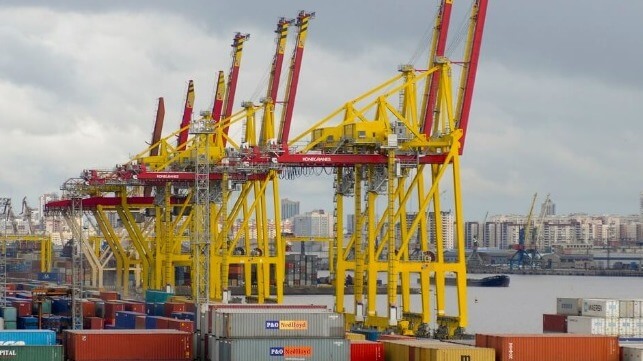Trade Data Shows the Negative Impact of Russia's Invasion of Ukraine

Global trade is taking a battering following the Russian invasion of Ukraine, with some of the world’s biggest economies recording significant hits due to disruptions of supply chains.
The German research organization Kiel Institute for the World Economy reports that after more than a month of war in Ukraine, the negative consequences for global trade are now becoming clear. By its estimate, the value of global trade declined by 2.8 percent between February and March.
The latest data update of the Kiel Trade Indicator - which uses traffic data at 500 ports to estimate the trade flows of 75 countries - shows the conflict is weighing heavily on almost all economies and on global trade overall.
The decline has been pronounced in Russia, where imports have declined by 9.7 percent and exports dropped by five percent. The country’s increasing isolation is reflected in the abrupt decline in the number of container ships arriving and departing from its ports.
According to the Kiel Trade Indicator, container freight traffic in Russia’s three largest ports of St. Petersburg, Vladivostok and Novorossiysk already slumping by half. “The sanctions imposed by the West are clearly having an effect, and the Russian population is facing an increasingly scarce supply of goods from abroad,” said Vincent Stamer, head of Kiel Trade Indicator.
He added that European companies and shipping lines are obviously restricting transport by sea with the same fate likely to impact trade via the more important road transport, something that explains the sharp decline in Russia’s imports.
The impacts on Ukraine have been dire, with the country practically cut off from international maritime trade. The Indicator shows that no large container ship has called at the country's most important port, Odessa, since the outbreak of war.
The European Union, Germany and the U.S, which have led in imposing tough sanctions against Russia, have also witnessed substantial decline in trade. For the EU, exports have declined by 5.6 percent and imports by 3.4 percent. For Germany, exports have fallen by 3.7 percent and imports by 3.2 percent. Over the same period, the U.S. recorded a 3.4 percent decline in exports and 0.6 percent in imports.
China, which has refused to condemn the invasion, has not suffered significant adverse impacts. Exports from China have declined by 0.9 percent while imports increased by the same margin.
“The tense situation in the global economy and a volatile container ship network are visible in the Kiel Trade Indicator as almost only negative signs are reported. Real distortions caused by Russia's invasion of Ukraine and the sanctions imposed by the West, as well as a high level of uncertainty among companies with relations to Russia, are noticeably setting back March trade,” said Stamer.
Kiel’s assessment of the impact of the invasion on global trade comes just days after the World Trade Organization revised its global trade growth forecast for this year downward from 4.7 percent to 2.5 percent.
Globally, the number of shipping containers in congestion is increasing again due to lockdowns in China. The indicator shows that currently, about 12 percent of all goods shipped worldwide are stuck.
“Future disruptions in China’s trade are by no means off the table, however, partly because the Omicron variant of the COVID-19 virus is still rampant. Of concern is the significant increase in global container ship congestion, which can also be attributed to lockdowns in China,” noted Stamer.

that matters most
Get the latest maritime news delivered to your inbox daily.
Top image: STS cranes at the Port of St. Petersburg (file image courtesy Andrew Shiva / CC BY-SA 4.0)
